The Role of Counselling Skills in Effective Counselling
VerifiedAdded on 2022/11/14
|7
|1891
|287
Essay
AI Summary
This essay delves into the essential role of basic counselling skills in facilitating effective counselling sessions. It examines key skills such as attending, listening, questioning, and empathy, illustrating their application through role-play examples. The paper discusses how these skills contribute to a supportive environment, enabling clients to explore their issues and work towards solutions. Furthermore, it critically analyzes the risks and limitations associated with each skill, acknowledging potential drawbacks and challenges in their application. By integrating personal opinions with relevant literature, the essay provides a comprehensive understanding of the complexities of counselling and the importance of skilled practitioners. The essay emphasizes that while counselling skills are beneficial, counselors must be aware of the limitations. The essay concludes that while these skills offer significant benefits, awareness of their limitations is crucial for responsible and effective practice.
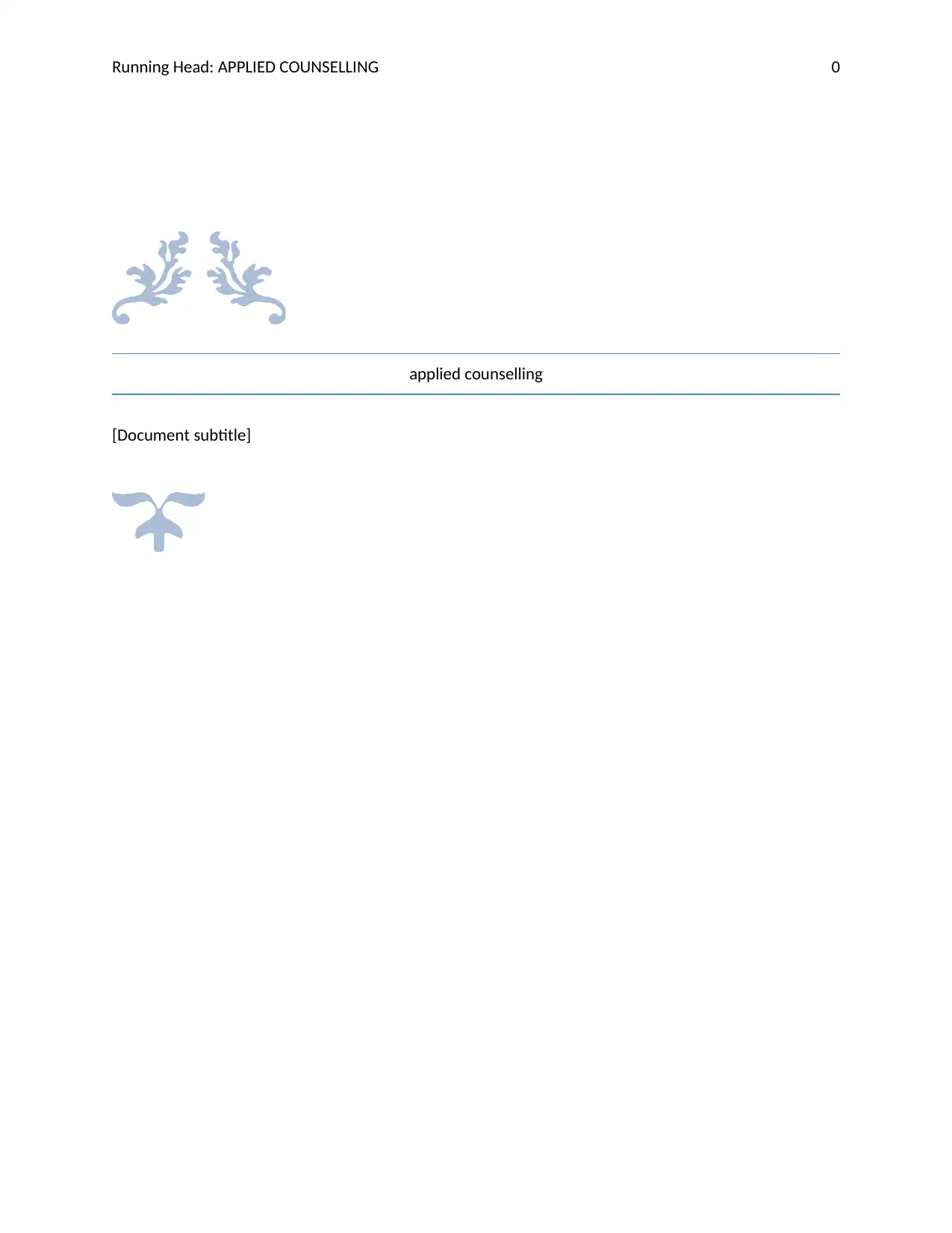
Running Head: APPLIED COUNSELLING 0
applied counselling
[Document subtitle]
applied counselling
[Document subtitle]
Paraphrase This Document
Need a fresh take? Get an instant paraphrase of this document with our AI Paraphraser

APPLIED COUNSELLING 1
Abstract
The following paper is about the role of counselling skills in an effective counselling
session. The paper describes various counselling skills such as attending, listening, questioning
and empathy with help of a role- play. The limitations and risks of these skills are also discussed
in the paper.in the end, the idea regarding counselling are presented in a short form.
Abstract
The following paper is about the role of counselling skills in an effective counselling
session. The paper describes various counselling skills such as attending, listening, questioning
and empathy with help of a role- play. The limitations and risks of these skills are also discussed
in the paper.in the end, the idea regarding counselling are presented in a short form.
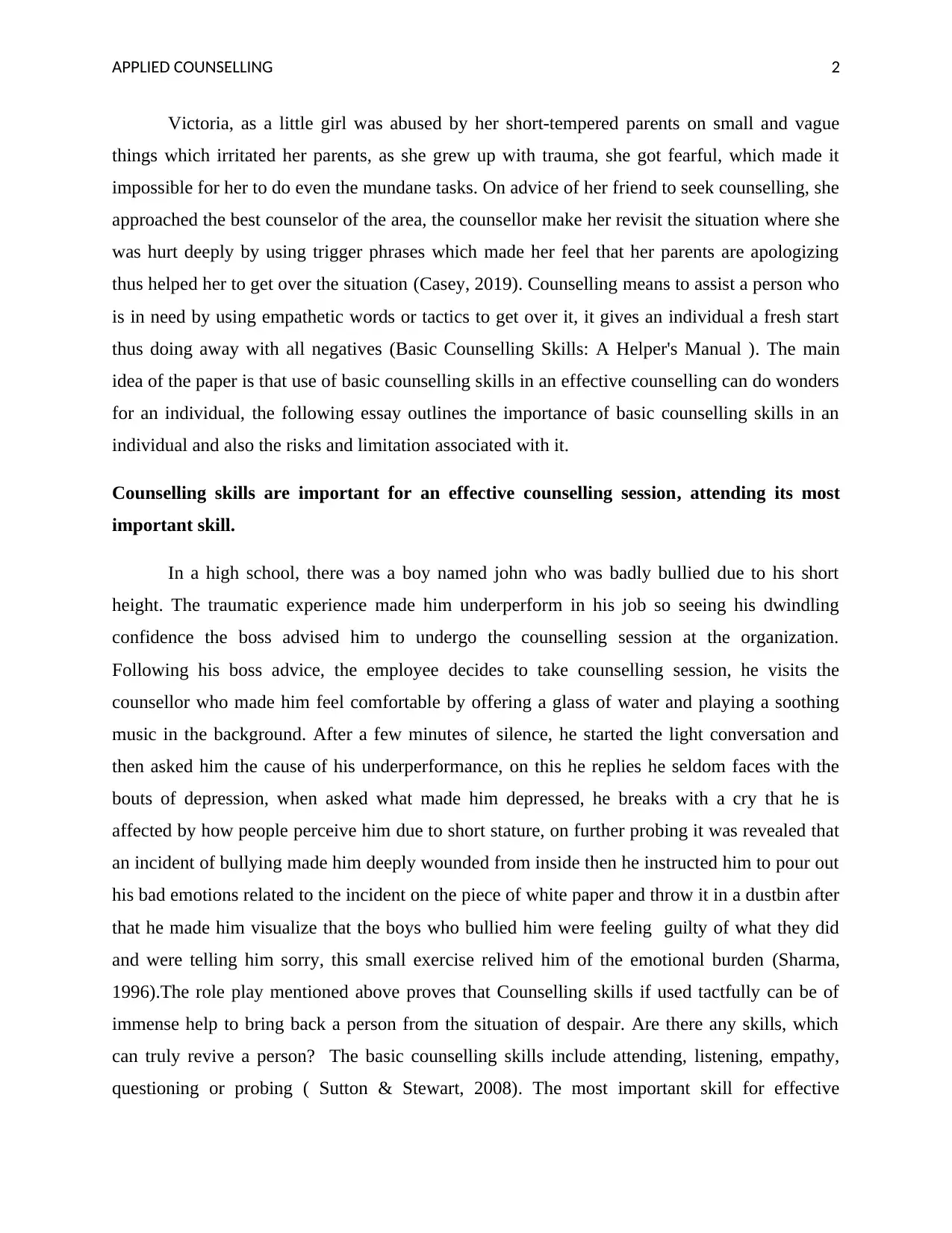
APPLIED COUNSELLING 2
Victoria, as a little girl was abused by her short-tempered parents on small and vague
things which irritated her parents, as she grew up with trauma, she got fearful, which made it
impossible for her to do even the mundane tasks. On advice of her friend to seek counselling, she
approached the best counselor of the area, the counsellor make her revisit the situation where she
was hurt deeply by using trigger phrases which made her feel that her parents are apologizing
thus helped her to get over the situation (Casey, 2019). Counselling means to assist a person who
is in need by using empathetic words or tactics to get over it, it gives an individual a fresh start
thus doing away with all negatives (Basic Counselling Skills: A Helper's Manual ). The main
idea of the paper is that use of basic counselling skills in an effective counselling can do wonders
for an individual, the following essay outlines the importance of basic counselling skills in an
individual and also the risks and limitation associated with it.
Counselling skills are important for an effective counselling session, attending its most
important skill.
In a high school, there was a boy named john who was badly bullied due to his short
height. The traumatic experience made him underperform in his job so seeing his dwindling
confidence the boss advised him to undergo the counselling session at the organization.
Following his boss advice, the employee decides to take counselling session, he visits the
counsellor who made him feel comfortable by offering a glass of water and playing a soothing
music in the background. After a few minutes of silence, he started the light conversation and
then asked him the cause of his underperformance, on this he replies he seldom faces with the
bouts of depression, when asked what made him depressed, he breaks with a cry that he is
affected by how people perceive him due to short stature, on further probing it was revealed that
an incident of bullying made him deeply wounded from inside then he instructed him to pour out
his bad emotions related to the incident on the piece of white paper and throw it in a dustbin after
that he made him visualize that the boys who bullied him were feeling guilty of what they did
and were telling him sorry, this small exercise relived him of the emotional burden (Sharma,
1996).The role play mentioned above proves that Counselling skills if used tactfully can be of
immense help to bring back a person from the situation of despair. Are there any skills, which
can truly revive a person? The basic counselling skills include attending, listening, empathy,
questioning or probing ( Sutton & Stewart, 2008). The most important skill for effective
Victoria, as a little girl was abused by her short-tempered parents on small and vague
things which irritated her parents, as she grew up with trauma, she got fearful, which made it
impossible for her to do even the mundane tasks. On advice of her friend to seek counselling, she
approached the best counselor of the area, the counsellor make her revisit the situation where she
was hurt deeply by using trigger phrases which made her feel that her parents are apologizing
thus helped her to get over the situation (Casey, 2019). Counselling means to assist a person who
is in need by using empathetic words or tactics to get over it, it gives an individual a fresh start
thus doing away with all negatives (Basic Counselling Skills: A Helper's Manual ). The main
idea of the paper is that use of basic counselling skills in an effective counselling can do wonders
for an individual, the following essay outlines the importance of basic counselling skills in an
individual and also the risks and limitation associated with it.
Counselling skills are important for an effective counselling session, attending its most
important skill.
In a high school, there was a boy named john who was badly bullied due to his short
height. The traumatic experience made him underperform in his job so seeing his dwindling
confidence the boss advised him to undergo the counselling session at the organization.
Following his boss advice, the employee decides to take counselling session, he visits the
counsellor who made him feel comfortable by offering a glass of water and playing a soothing
music in the background. After a few minutes of silence, he started the light conversation and
then asked him the cause of his underperformance, on this he replies he seldom faces with the
bouts of depression, when asked what made him depressed, he breaks with a cry that he is
affected by how people perceive him due to short stature, on further probing it was revealed that
an incident of bullying made him deeply wounded from inside then he instructed him to pour out
his bad emotions related to the incident on the piece of white paper and throw it in a dustbin after
that he made him visualize that the boys who bullied him were feeling guilty of what they did
and were telling him sorry, this small exercise relived him of the emotional burden (Sharma,
1996).The role play mentioned above proves that Counselling skills if used tactfully can be of
immense help to bring back a person from the situation of despair. Are there any skills, which
can truly revive a person? The basic counselling skills include attending, listening, empathy,
questioning or probing ( Sutton & Stewart, 2008). The most important skill for effective
⊘ This is a preview!⊘
Do you want full access?
Subscribe today to unlock all pages.

Trusted by 1+ million students worldwide
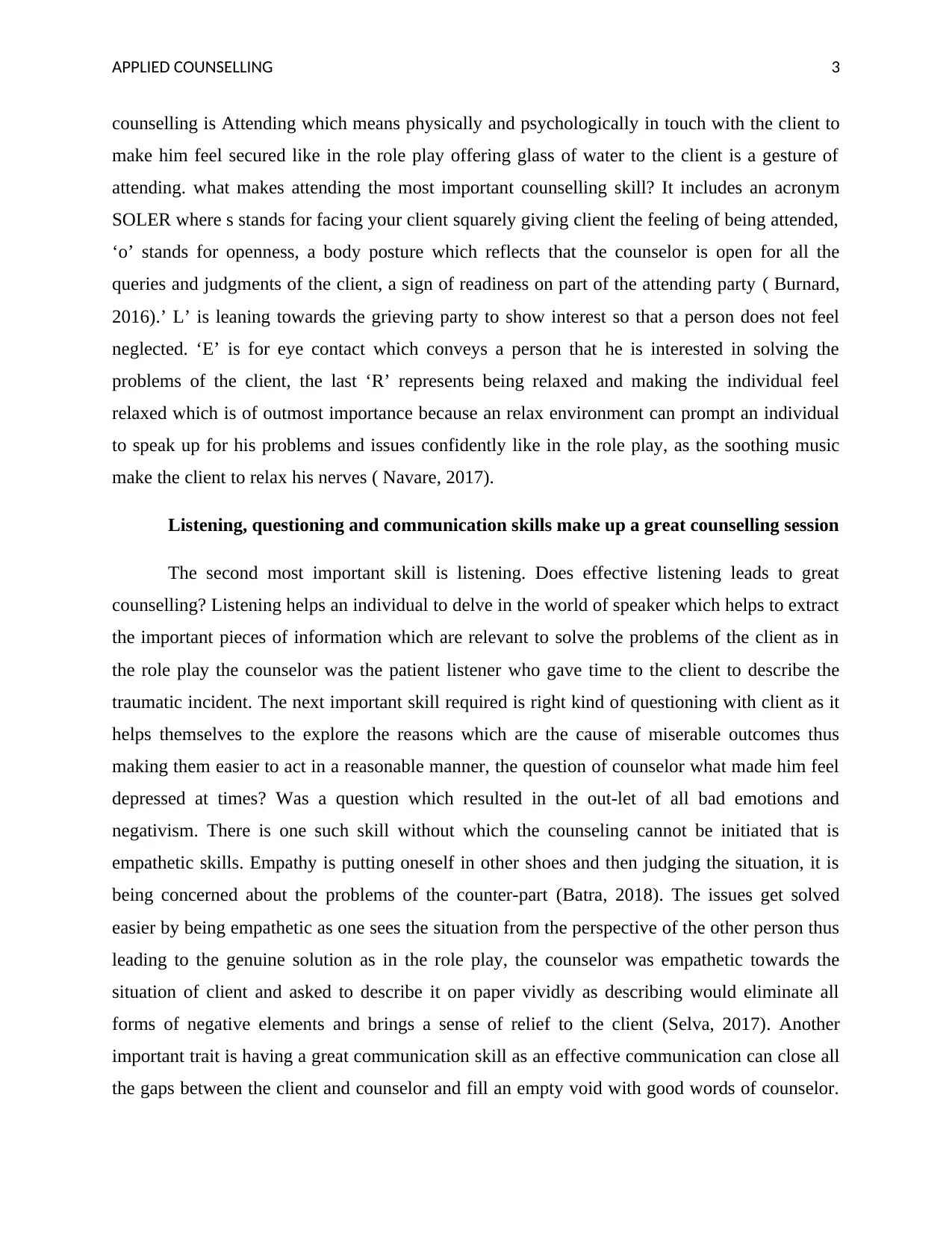
APPLIED COUNSELLING 3
counselling is Attending which means physically and psychologically in touch with the client to
make him feel secured like in the role play offering glass of water to the client is a gesture of
attending. what makes attending the most important counselling skill? It includes an acronym
SOLER where s stands for facing your client squarely giving client the feeling of being attended,
‘o’ stands for openness, a body posture which reflects that the counselor is open for all the
queries and judgments of the client, a sign of readiness on part of the attending party ( Burnard,
2016).’ L’ is leaning towards the grieving party to show interest so that a person does not feel
neglected. ‘E’ is for eye contact which conveys a person that he is interested in solving the
problems of the client, the last ‘R’ represents being relaxed and making the individual feel
relaxed which is of outmost importance because an relax environment can prompt an individual
to speak up for his problems and issues confidently like in the role play, as the soothing music
make the client to relax his nerves ( Navare, 2017).
Listening, questioning and communication skills make up a great counselling session
The second most important skill is listening. Does effective listening leads to great
counselling? Listening helps an individual to delve in the world of speaker which helps to extract
the important pieces of information which are relevant to solve the problems of the client as in
the role play the counselor was the patient listener who gave time to the client to describe the
traumatic incident. The next important skill required is right kind of questioning with client as it
helps themselves to the explore the reasons which are the cause of miserable outcomes thus
making them easier to act in a reasonable manner, the question of counselor what made him feel
depressed at times? Was a question which resulted in the out-let of all bad emotions and
negativism. There is one such skill without which the counseling cannot be initiated that is
empathetic skills. Empathy is putting oneself in other shoes and then judging the situation, it is
being concerned about the problems of the counter-part (Batra, 2018). The issues get solved
easier by being empathetic as one sees the situation from the perspective of the other person thus
leading to the genuine solution as in the role play, the counselor was empathetic towards the
situation of client and asked to describe it on paper vividly as describing would eliminate all
forms of negative elements and brings a sense of relief to the client (Selva, 2017). Another
important trait is having a great communication skill as an effective communication can close all
the gaps between the client and counselor and fill an empty void with good words of counselor.
counselling is Attending which means physically and psychologically in touch with the client to
make him feel secured like in the role play offering glass of water to the client is a gesture of
attending. what makes attending the most important counselling skill? It includes an acronym
SOLER where s stands for facing your client squarely giving client the feeling of being attended,
‘o’ stands for openness, a body posture which reflects that the counselor is open for all the
queries and judgments of the client, a sign of readiness on part of the attending party ( Burnard,
2016).’ L’ is leaning towards the grieving party to show interest so that a person does not feel
neglected. ‘E’ is for eye contact which conveys a person that he is interested in solving the
problems of the client, the last ‘R’ represents being relaxed and making the individual feel
relaxed which is of outmost importance because an relax environment can prompt an individual
to speak up for his problems and issues confidently like in the role play, as the soothing music
make the client to relax his nerves ( Navare, 2017).
Listening, questioning and communication skills make up a great counselling session
The second most important skill is listening. Does effective listening leads to great
counselling? Listening helps an individual to delve in the world of speaker which helps to extract
the important pieces of information which are relevant to solve the problems of the client as in
the role play the counselor was the patient listener who gave time to the client to describe the
traumatic incident. The next important skill required is right kind of questioning with client as it
helps themselves to the explore the reasons which are the cause of miserable outcomes thus
making them easier to act in a reasonable manner, the question of counselor what made him feel
depressed at times? Was a question which resulted in the out-let of all bad emotions and
negativism. There is one such skill without which the counseling cannot be initiated that is
empathetic skills. Empathy is putting oneself in other shoes and then judging the situation, it is
being concerned about the problems of the counter-part (Batra, 2018). The issues get solved
easier by being empathetic as one sees the situation from the perspective of the other person thus
leading to the genuine solution as in the role play, the counselor was empathetic towards the
situation of client and asked to describe it on paper vividly as describing would eliminate all
forms of negative elements and brings a sense of relief to the client (Selva, 2017). Another
important trait is having a great communication skill as an effective communication can close all
the gaps between the client and counselor and fill an empty void with good words of counselor.
Paraphrase This Document
Need a fresh take? Get an instant paraphrase of this document with our AI Paraphraser
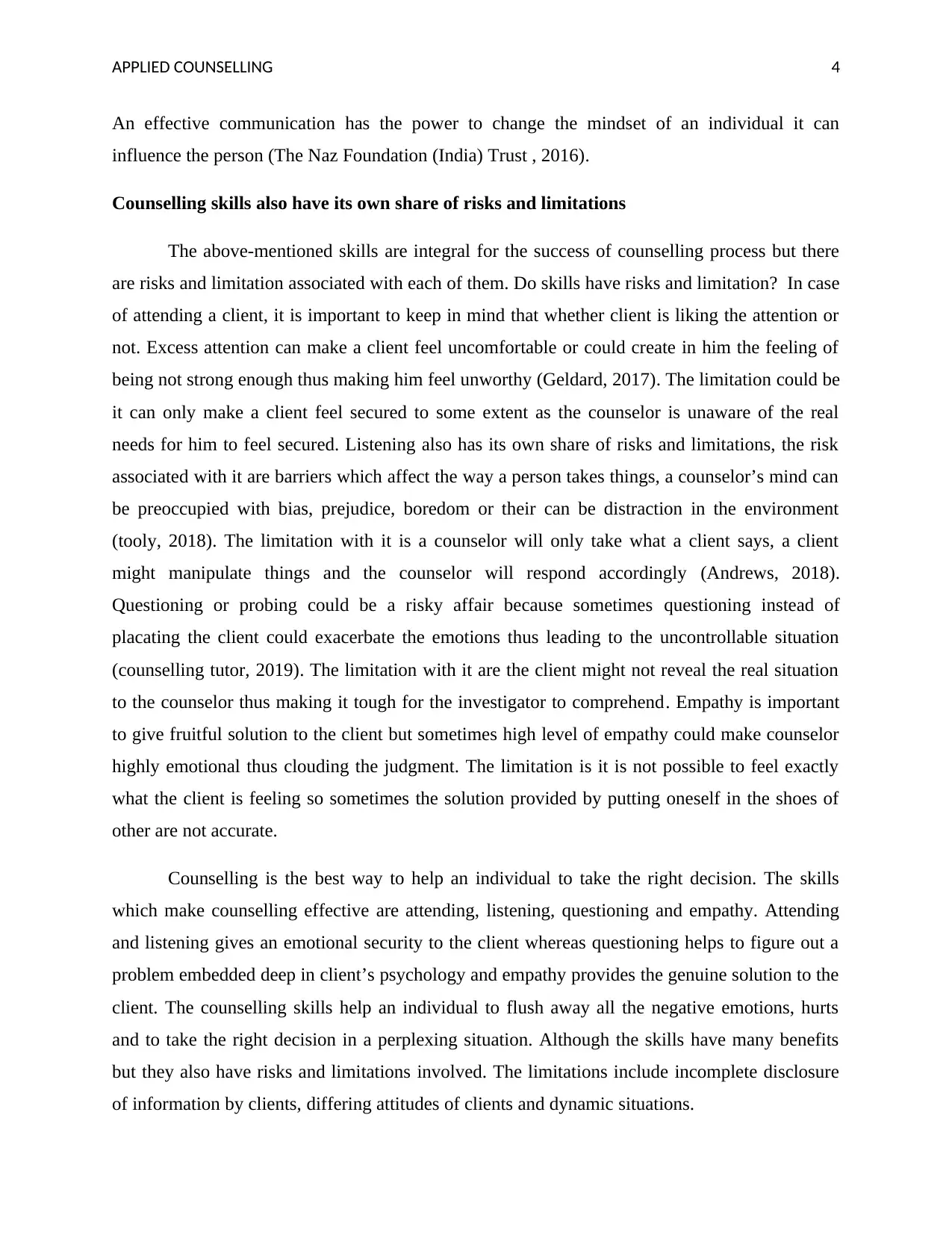
APPLIED COUNSELLING 4
An effective communication has the power to change the mindset of an individual it can
influence the person (The Naz Foundation (India) Trust , 2016).
Counselling skills also have its own share of risks and limitations
The above-mentioned skills are integral for the success of counselling process but there
are risks and limitation associated with each of them. Do skills have risks and limitation? In case
of attending a client, it is important to keep in mind that whether client is liking the attention or
not. Excess attention can make a client feel uncomfortable or could create in him the feeling of
being not strong enough thus making him feel unworthy (Geldard, 2017). The limitation could be
it can only make a client feel secured to some extent as the counselor is unaware of the real
needs for him to feel secured. Listening also has its own share of risks and limitations, the risk
associated with it are barriers which affect the way a person takes things, a counselor’s mind can
be preoccupied with bias, prejudice, boredom or their can be distraction in the environment
(tooly, 2018). The limitation with it is a counselor will only take what a client says, a client
might manipulate things and the counselor will respond accordingly (Andrews, 2018).
Questioning or probing could be a risky affair because sometimes questioning instead of
placating the client could exacerbate the emotions thus leading to the uncontrollable situation
(counselling tutor, 2019). The limitation with it are the client might not reveal the real situation
to the counselor thus making it tough for the investigator to comprehend. Empathy is important
to give fruitful solution to the client but sometimes high level of empathy could make counselor
highly emotional thus clouding the judgment. The limitation is it is not possible to feel exactly
what the client is feeling so sometimes the solution provided by putting oneself in the shoes of
other are not accurate.
Counselling is the best way to help an individual to take the right decision. The skills
which make counselling effective are attending, listening, questioning and empathy. Attending
and listening gives an emotional security to the client whereas questioning helps to figure out a
problem embedded deep in client’s psychology and empathy provides the genuine solution to the
client. The counselling skills help an individual to flush away all the negative emotions, hurts
and to take the right decision in a perplexing situation. Although the skills have many benefits
but they also have risks and limitations involved. The limitations include incomplete disclosure
of information by clients, differing attitudes of clients and dynamic situations.
An effective communication has the power to change the mindset of an individual it can
influence the person (The Naz Foundation (India) Trust , 2016).
Counselling skills also have its own share of risks and limitations
The above-mentioned skills are integral for the success of counselling process but there
are risks and limitation associated with each of them. Do skills have risks and limitation? In case
of attending a client, it is important to keep in mind that whether client is liking the attention or
not. Excess attention can make a client feel uncomfortable or could create in him the feeling of
being not strong enough thus making him feel unworthy (Geldard, 2017). The limitation could be
it can only make a client feel secured to some extent as the counselor is unaware of the real
needs for him to feel secured. Listening also has its own share of risks and limitations, the risk
associated with it are barriers which affect the way a person takes things, a counselor’s mind can
be preoccupied with bias, prejudice, boredom or their can be distraction in the environment
(tooly, 2018). The limitation with it is a counselor will only take what a client says, a client
might manipulate things and the counselor will respond accordingly (Andrews, 2018).
Questioning or probing could be a risky affair because sometimes questioning instead of
placating the client could exacerbate the emotions thus leading to the uncontrollable situation
(counselling tutor, 2019). The limitation with it are the client might not reveal the real situation
to the counselor thus making it tough for the investigator to comprehend. Empathy is important
to give fruitful solution to the client but sometimes high level of empathy could make counselor
highly emotional thus clouding the judgment. The limitation is it is not possible to feel exactly
what the client is feeling so sometimes the solution provided by putting oneself in the shoes of
other are not accurate.
Counselling is the best way to help an individual to take the right decision. The skills
which make counselling effective are attending, listening, questioning and empathy. Attending
and listening gives an emotional security to the client whereas questioning helps to figure out a
problem embedded deep in client’s psychology and empathy provides the genuine solution to the
client. The counselling skills help an individual to flush away all the negative emotions, hurts
and to take the right decision in a perplexing situation. Although the skills have many benefits
but they also have risks and limitations involved. The limitations include incomplete disclosure
of information by clients, differing attitudes of clients and dynamic situations.
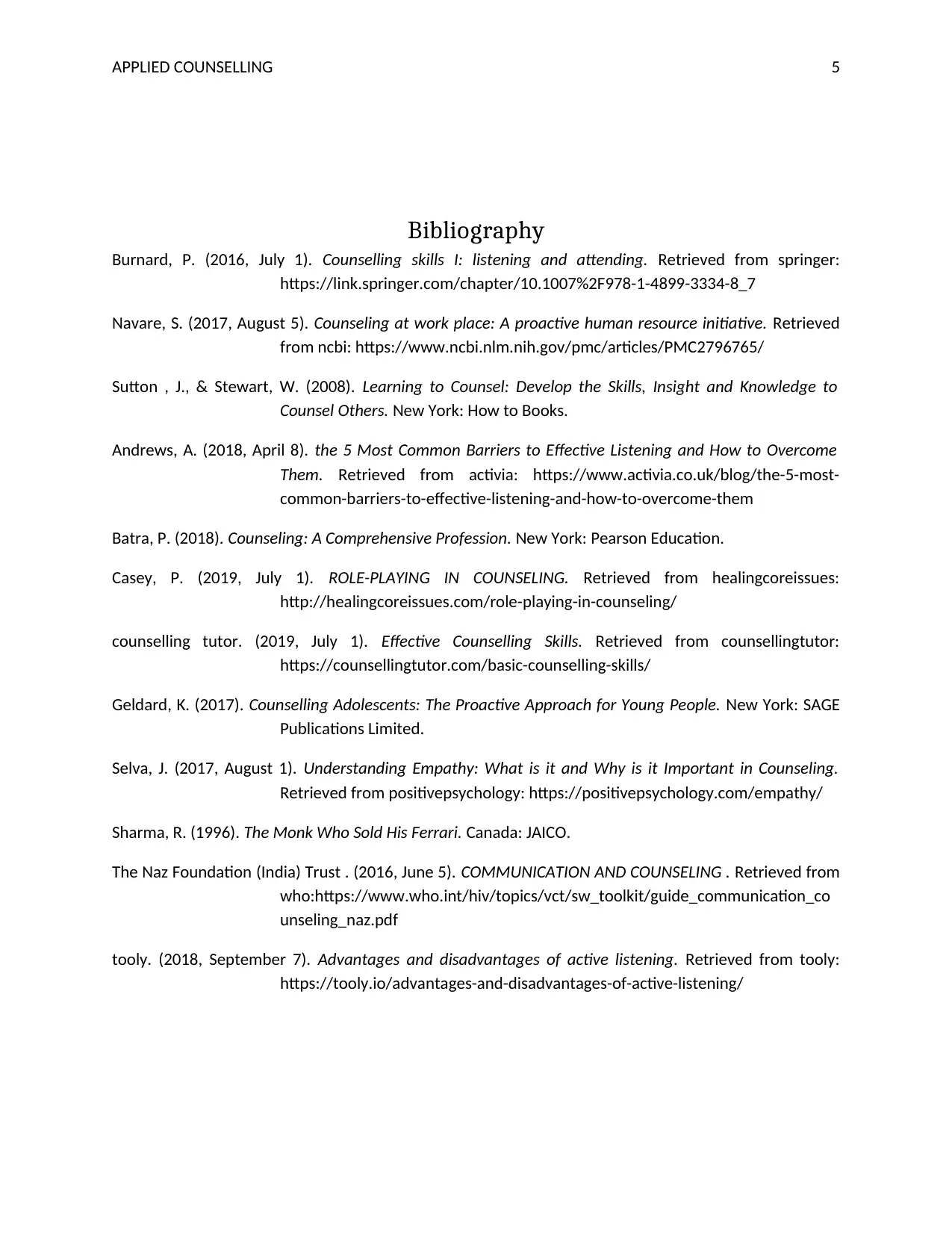
APPLIED COUNSELLING 5
Bibliography
Burnard, P. (2016, July 1). Counselling skills I: listening and attending. Retrieved from springer:
https://link.springer.com/chapter/10.1007%2F978-1-4899-3334-8_7
Navare, S. (2017, August 5). Counseling at work place: A proactive human resource initiative. Retrieved
from ncbi: https://www.ncbi.nlm.nih.gov/pmc/articles/PMC2796765/
Sutton , J., & Stewart, W. (2008). Learning to Counsel: Develop the Skills, Insight and Knowledge to
Counsel Others. New York: How to Books.
Andrews, A. (2018, April 8). the 5 Most Common Barriers to Effective Listening and How to Overcome
Them. Retrieved from activia: https://www.activia.co.uk/blog/the-5-most-
common-barriers-to-effective-listening-and-how-to-overcome-them
Batra, P. (2018). Counseling: A Comprehensive Profession. New York: Pearson Education.
Casey, P. (2019, July 1). ROLE-PLAYING IN COUNSELING. Retrieved from healingcoreissues:
http://healingcoreissues.com/role-playing-in-counseling/
counselling tutor. (2019, July 1). Effective Counselling Skills. Retrieved from counsellingtutor:
https://counsellingtutor.com/basic-counselling-skills/
Geldard, K. (2017). Counselling Adolescents: The Proactive Approach for Young People. New York: SAGE
Publications Limited.
Selva, J. (2017, August 1). Understanding Empathy: What is it and Why is it Important in Counseling.
Retrieved from positivepsychology: https://positivepsychology.com/empathy/
Sharma, R. (1996). The Monk Who Sold His Ferrari. Canada: JAICO.
The Naz Foundation (India) Trust . (2016, June 5). COMMUNICATION AND COUNSELING . Retrieved from
who:https://www.who.int/hiv/topics/vct/sw_toolkit/guide_communication_co
unseling_naz.pdf
tooly. (2018, September 7). Advantages and disadvantages of active listening. Retrieved from tooly:
https://tooly.io/advantages-and-disadvantages-of-active-listening/
Bibliography
Burnard, P. (2016, July 1). Counselling skills I: listening and attending. Retrieved from springer:
https://link.springer.com/chapter/10.1007%2F978-1-4899-3334-8_7
Navare, S. (2017, August 5). Counseling at work place: A proactive human resource initiative. Retrieved
from ncbi: https://www.ncbi.nlm.nih.gov/pmc/articles/PMC2796765/
Sutton , J., & Stewart, W. (2008). Learning to Counsel: Develop the Skills, Insight and Knowledge to
Counsel Others. New York: How to Books.
Andrews, A. (2018, April 8). the 5 Most Common Barriers to Effective Listening and How to Overcome
Them. Retrieved from activia: https://www.activia.co.uk/blog/the-5-most-
common-barriers-to-effective-listening-and-how-to-overcome-them
Batra, P. (2018). Counseling: A Comprehensive Profession. New York: Pearson Education.
Casey, P. (2019, July 1). ROLE-PLAYING IN COUNSELING. Retrieved from healingcoreissues:
http://healingcoreissues.com/role-playing-in-counseling/
counselling tutor. (2019, July 1). Effective Counselling Skills. Retrieved from counsellingtutor:
https://counsellingtutor.com/basic-counselling-skills/
Geldard, K. (2017). Counselling Adolescents: The Proactive Approach for Young People. New York: SAGE
Publications Limited.
Selva, J. (2017, August 1). Understanding Empathy: What is it and Why is it Important in Counseling.
Retrieved from positivepsychology: https://positivepsychology.com/empathy/
Sharma, R. (1996). The Monk Who Sold His Ferrari. Canada: JAICO.
The Naz Foundation (India) Trust . (2016, June 5). COMMUNICATION AND COUNSELING . Retrieved from
who:https://www.who.int/hiv/topics/vct/sw_toolkit/guide_communication_co
unseling_naz.pdf
tooly. (2018, September 7). Advantages and disadvantages of active listening. Retrieved from tooly:
https://tooly.io/advantages-and-disadvantages-of-active-listening/
⊘ This is a preview!⊘
Do you want full access?
Subscribe today to unlock all pages.

Trusted by 1+ million students worldwide

APPLIED COUNSELLING 6
1 out of 7
Related Documents
Your All-in-One AI-Powered Toolkit for Academic Success.
+13062052269
info@desklib.com
Available 24*7 on WhatsApp / Email
![[object Object]](/_next/static/media/star-bottom.7253800d.svg)
Unlock your academic potential
Copyright © 2020–2026 A2Z Services. All Rights Reserved. Developed and managed by ZUCOL.





